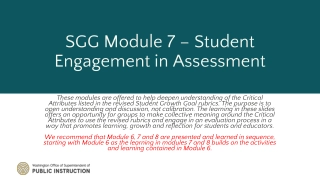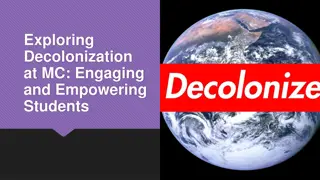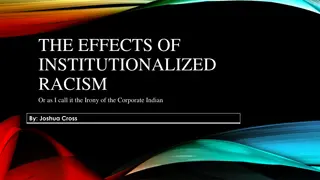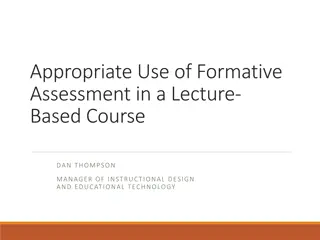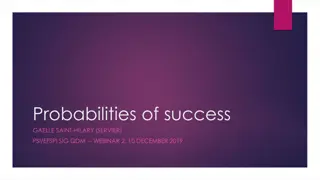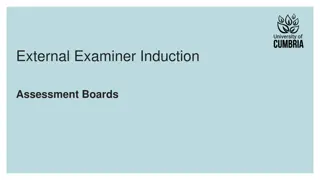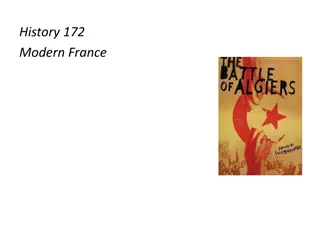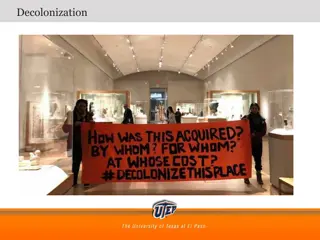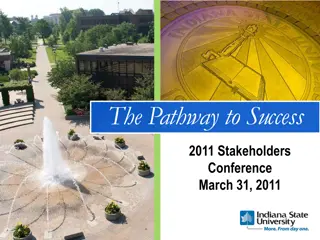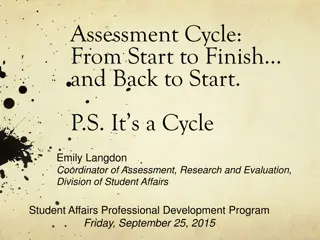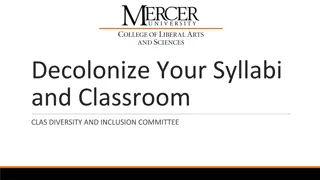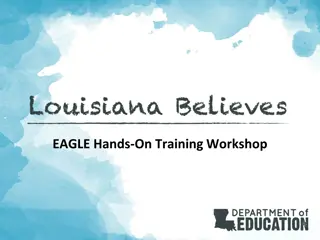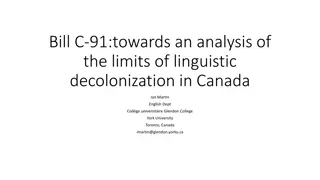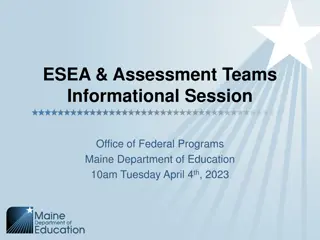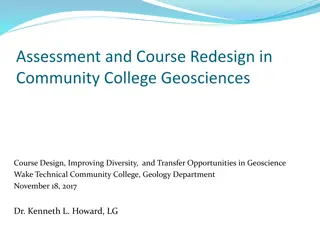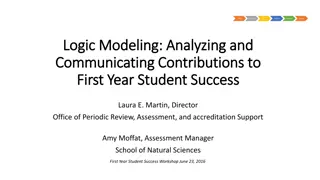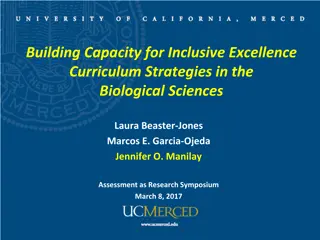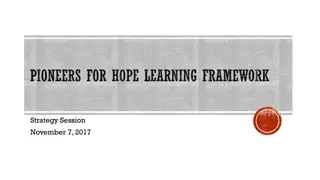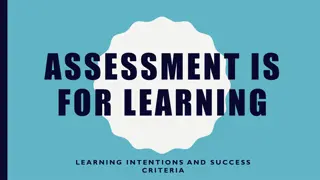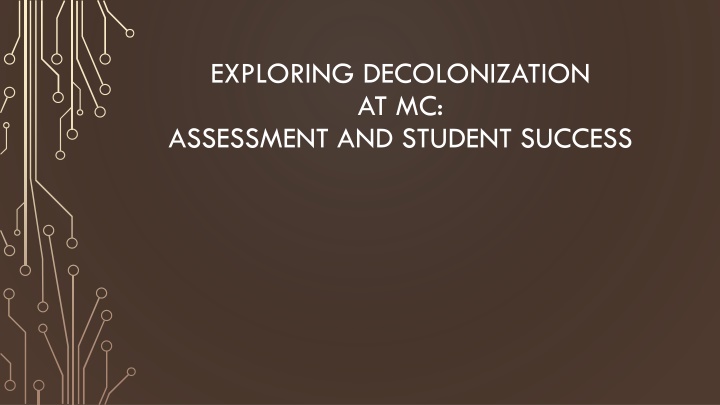
Exploring Decolonization Strategies for Student Success in Higher Education
Delve into innovative teaching and assessment strategies focused on decolonization, student engagement, and empowerment in higher education. Discover ways to redefine student success, evaluate assessment practices, and align beliefs with actionable strategies for improved outcomes.
Download Presentation

Please find below an Image/Link to download the presentation.
The content on the website is provided AS IS for your information and personal use only. It may not be sold, licensed, or shared on other websites without obtaining consent from the author. If you encounter any issues during the download, it is possible that the publisher has removed the file from their server.
You are allowed to download the files provided on this website for personal or commercial use, subject to the condition that they are used lawfully. All files are the property of their respective owners.
The content on the website is provided AS IS for your information and personal use only. It may not be sold, licensed, or shared on other websites without obtaining consent from the author.
E N D
Presentation Transcript
EXPLORING DECOLONIZATION AT MC: ASSESSMENT AND STUDENT SUCCESS
Get to know students names and build relationships Engage in self-reflection Teach about decolonization Offer choices Change the structure of the room Ask questions that promote critical thinking about the content Address the knowledge-power dynamic Engage student voices Adopt alternative assessment techniques RECAP OF SESSION 3: TEACHING AND LEARNING STRATEGIES
1. Syllabus statement 2. Use storytelling to share knowledge 3. Student passion projects 4. Service Learning RECAP OF SESSION 4: ENGAGING AND EMPOWERING STUDENTS
Reflect on common assessment practices Evaluate multiple modes of assessment to capture student learning OUTCOMES
HOW DO YOU DEFINE STUDENT SUCCESS? POST YOUR RESPONSES IN THE CHAT This Photo by Unknown Author is licensed under CC BY-NC
COMMON WAYS OF DETERMINING STUDENT SUCCESS Course placement Scores/grades on individual assignments Low DFW rates Completion rates
From: Montgomery College. (2021). Student success scorecard. https://www.montgomerycollege.edu/about-mc/office-of-the-president/score-card.html
Nazereth College. (2014). Definition of student success. https://www2.naz.edu/student-support- services/rss-taskforce.
DISCUSSION: What informs our beliefs about student success? Do those beliefs match our assessment practices (at either the course or program level)? This Photo by Unknown Author is licensed under CC BY
WHAT CAN WE LEARN (AND ADAPT) FROM INDIGENOUS EVALUATION PRINCIPLES?
Indigenous Worldview vs. Western Worldview Humans are separate from nature, with humans at top of hierarchy Inanimate objects (even in nature) lack spirit The measurable and quantifiable are real Importance of individuality and competition Authority figures and institutions have power and influence, control and domination mean survival Reinforces external rewards and punishments Emphasizes assessment through pen-and-paper- type, tests Compartmentalizes knowledge and experience Authentic reverence for women, gender fluidity, equality, cooperation, honesty, wellness, peace, harmony, restorative justice, democracy, ecological sustainability, and nonhierarchical organizational structures Harmonious living between humans and non- humans Interconnectedness (human, non-human, nature) Knowledge, experience, and life as unified and holistic From: Preston, J.P. & Claypool, T.R. (2021). Analyzing assessment practices for Indigenous students. Frontiers in Education.https://doi.org/10.3389/feduc.2021.679972.
DECOLONIZE VS. INDIGENIZE WHAT IS THE DIFFERENCE? POST IN THE CHAT. From Cultural Research Network. (2020). Decolonizing Evaluation: An in-depth look into equitable evaluation work with First Nations communities. Video. http://culturalresearchnetwork.org/october-27-28-virtual-study-group-decolonizing-evaluation-an-in-depth-look- into-equitable-evaluation-work-with-first-nations-communities
INDIGENOUS EVALUATION FRAMEWORK What words/ideas resonate with you? Post in chat. From: Kawakami, A.J., Aton, K., Cram, F., Lai, M.K., & Porima, L. (2007). Improving the practice of evaluation through Indigenous values and methods: Decolonizing evaluation practice Returning the gaze rom Hawai i and Aotearoa. https://uaf.edu/ces/files/internal/reporting/programevals/improving_the_practice_of_evaluation_through_indigenous_values_and_methods.p df
What METHOD VS. METHODOLOGY ~Maggie Walter words/ideas resonate with you? Post in chat. Method (the way we gather data) and methodology (how you approach the research including questions, problems, etc.) Methodology should be indigenous-centered and ask questions: Epistemology: What is your position? What is knowledge? How do you do knowledge? Who do you value as a knower? How do you prioritize different knowledge systems? Axiology: What assumptions/presumptions/values do you bring around those people and topics? Ontology: Who are you and how do you see the world in relation to what you are researching? Study the colonized in order to decolonize From Cultural Research Network. (2020). Decolonizing Evaluation: An in-depth look into equitable evaluation work with First Nations communities. Video. http://culturalresearchnetwork.org/october-27-28-virtual-study-group-decolonizing-evaluation-an-in-depth-look-into-equitable- evaluation-work-with-first-nations-communities/
RECONCILIATION WITH WESTERN CULTURE ~Andrea Johnston What words/ideas resonate with you? Post in chat. Recognizing truth Storyboard to document experiences, tell a story (too many lack story of community strengths) Let evaluation fit community not vice versa Consider spirit in evaluation From Cultural Research Network. (2020). Decolonizing Evaluation: An in-depth look into equitable evaluation work with First Nations communities. Video. http://culturalresearchnetwork.org/october-27-28-virtual-study-group-decolonizing-evaluation-an-in-depth- look-into-equitable-evaluation-work-with-first-nations-communities/
What MINIMIZE HARM AND UPLIFT COMMUNITY ~Anita Cram Allow people to define their own space and meet on their own terms Be a face that is known and seen within a community Look and listen (and then maybe speak) develop understanding to find a place from which to speak Share, host, and be generous Be careful be politically astute, culturally safe, and reflective about insider/outsider status Do not trample on the status or dignity of a person Be humble do not flaunt your knowledge, find ways of sharing it words/ideas resonate with you? Post in chat. From Cultural Research Network. (2020). Decolonizing Evaluation: An in-depth look into equitable evaluation work with First Nations communities. Video. http://culturalresearchnetwork.org/october-27-28-virtual-study-group-decolonizing-evaluation-an-in-depth-look- into-equitable-evaluation-work-with-first-nations-communities/
Think about the words and ideas posted in the chat. What if we approached assessment and evaluation through an indigenous lens? How could you use these ideas to inform your own assessment practices at the course and/or program level? EX: I could shift the way I ___ by adapting/applying ______. Please post in the chat.
QUESTIONS This Photo by Unknown Author is licensed under CC BY-NC

